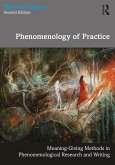Mark D. Vagle
Crafting Phenomenological Research
Mark D. Vagle
Crafting Phenomenological Research
- Broschiertes Buch
- Merkliste
- Auf die Merkliste
- Bewerten Bewerten
- Teilen
- Produkt teilen
- Produkterinnerung
- Produkterinnerung
An accessible, concise introduction to phenomenological research in education and social sciences. Mark Vagle outlines the key principles for conducting this research from leading contemporary practitioners, such as van Manen, Giorgi, and Dahlberg.
Andere Kunden interessierten sich auch für
![Crafting Phenomenological Research Crafting Phenomenological Research]() Mark D. VagleCrafting Phenomenological Research42,99 €
Mark D. VagleCrafting Phenomenological Research42,99 €![Phenomenology of Practice Phenomenology of Practice]() Max Van ManenPhenomenology of Practice46,99 €
Max Van ManenPhenomenology of Practice46,99 €![Phenomenological Perspectives on Place, Lifeworlds, and Lived Emplacement Phenomenological Perspectives on Place, Lifeworlds, and Lived Emplacement]() David Seamon (USA Kansas State University)Phenomenological Perspectives on Place, Lifeworlds, and Lived Emplacement56,99 €
David Seamon (USA Kansas State University)Phenomenological Perspectives on Place, Lifeworlds, and Lived Emplacement56,99 €![Researching Lived Experience Researching Lived Experience]() Max Van ManenResearching Lived Experience43,99 €
Max Van ManenResearching Lived Experience43,99 €![Classic Writings for a Phenomenology of Practice Classic Writings for a Phenomenology of Practice]() Classic Writings for a Phenomenology of Practice46,99 €
Classic Writings for a Phenomenology of Practice46,99 €![Pedagogical Tact Pedagogical Tact]() Max Van ManenPedagogical Tact38,99 €
Max Van ManenPedagogical Tact38,99 €![Eight Domains of Phenomenology and Research Methods Eight Domains of Phenomenology and Research Methods]() Henrik Gert LarsenEight Domains of Phenomenology and Research Methods31,99 €
Henrik Gert LarsenEight Domains of Phenomenology and Research Methods31,99 €-
-
-
An accessible, concise introduction to phenomenological research in education and social sciences. Mark Vagle outlines the key principles for conducting this research from leading contemporary practitioners, such as van Manen, Giorgi, and Dahlberg.
Produktdetails
- Produktdetails
- Verlag: Taylor & Francis Ltd
- 2 ed
- Seitenzahl: 198
- Erscheinungstermin: 4. April 2018
- Englisch
- Abmessung: 229mm x 152mm x 12mm
- Gewicht: 318g
- ISBN-13: 9781138042667
- ISBN-10: 1138042668
- Artikelnr.: 52397450
- Herstellerkennzeichnung
- Libri GmbH
- Europaallee 1
- 36244 Bad Hersfeld
- gpsr@libri.de
- Verlag: Taylor & Francis Ltd
- 2 ed
- Seitenzahl: 198
- Erscheinungstermin: 4. April 2018
- Englisch
- Abmessung: 229mm x 152mm x 12mm
- Gewicht: 318g
- ISBN-13: 9781138042667
- ISBN-10: 1138042668
- Artikelnr.: 52397450
- Herstellerkennzeichnung
- Libri GmbH
- Europaallee 1
- 36244 Bad Hersfeld
- gpsr@libri.de
Mark D. Vagle is Professor of Curriculum and Instruction at the University of Minnesota, USA. He has written extensively on phenomenological research in journals such as Qualitative Inquiry, The International Journal of Qualitative Studies in Education, The Journal of Curriculum Studies, Cultural Studies - Critical Methodologies, Field Methods, and Teaching Education, and regularly teaches university courses and professional workshops on the subject. Currently, Vagle is using his conception of post-intentional phenomenology to critically examine various ways in which issues related to social class take concrete (lived) shape in the curriculum and pedagogies of elementary education.
Acknowledgments and Credits
Introduction
Part I. Exploring Philosophical Concepts and Notions in Phenomenology
Chapter 1. Phenomenology-A Historical Background
Chapter 2. What Is a Phenomenon in Phenomenology?
Chapter 3. What Is Intentionality and Why Is It Important?
Chapter 4. The Importance of Prepositions
Resource Dig (Section 1)
Part II. Phenomenological Research Approaches
Chapter 5. Possible Methodological Approaches
Chapter 6. Phenomenological Research Methodology: Research Design
Considerations
Chapter 7. Gathering Phenomenological Material
Chapter 8. Analyzing Phenomenological Material
Resource Dig (Section 2)
Part III. A Post-Intentional Approach to Phenomenological Research
Chapter 9. Post-Intentional Phenomenology
Chapter 10. Post-Intentional Methodology
Chapter 11. Post-Intentional Phenomenology in Practice
Resource Dig (Section 3)
Chapter 12. Epilogue
Introduction
Part I. Exploring Philosophical Concepts and Notions in Phenomenology
Chapter 1. Phenomenology-A Historical Background
Chapter 2. What Is a Phenomenon in Phenomenology?
Chapter 3. What Is Intentionality and Why Is It Important?
Chapter 4. The Importance of Prepositions
Resource Dig (Section 1)
Part II. Phenomenological Research Approaches
Chapter 5. Possible Methodological Approaches
Chapter 6. Phenomenological Research Methodology: Research Design
Considerations
Chapter 7. Gathering Phenomenological Material
Chapter 8. Analyzing Phenomenological Material
Resource Dig (Section 2)
Part III. A Post-Intentional Approach to Phenomenological Research
Chapter 9. Post-Intentional Phenomenology
Chapter 10. Post-Intentional Methodology
Chapter 11. Post-Intentional Phenomenology in Practice
Resource Dig (Section 3)
Chapter 12. Epilogue
Part I: Exploring Philosophical Concepts and Notions in Phenomenology 1. Phenomenology: A Historical Background 2. What Is a Phenomenon in Phenomenology? 3. What Is Intentionality and Why Is it Important? 4. The Importance of Prepositions Resource Dig (Part I); Part II: Phenomenological Research Approaches 5. Possible Methodological Approaches 6. Phenomenological Research Methodology: Research Design Considerations 7. Gathering Phenomenological Material 8. Analyzing Phenomenological Material in Descriptive, Interpretive, and Reflective Lifeworld Approaches Resource Dig (Part II); Part III: A Post-Intentional Approach to Phenomenological Research 9. Post-Intentional Phenomenological Philosophy 10. PIP Research Methodology: The Five-Component Approach 11. PIP Research Methodology: The PIP Triangle Resource Dig (Part III); Epilogue Appendix: Additional Resources
Acknowledgments and Credits
Introduction
Part I. Exploring Philosophical Concepts and Notions in Phenomenology
Chapter 1. Phenomenology-A Historical Background
Chapter 2. What Is a Phenomenon in Phenomenology?
Chapter 3. What Is Intentionality and Why Is It Important?
Chapter 4. The Importance of Prepositions
Resource Dig (Section 1)
Part II. Phenomenological Research Approaches
Chapter 5. Possible Methodological Approaches
Chapter 6. Phenomenological Research Methodology: Research Design
Considerations
Chapter 7. Gathering Phenomenological Material
Chapter 8. Analyzing Phenomenological Material
Resource Dig (Section 2)
Part III. A Post-Intentional Approach to Phenomenological Research
Chapter 9. Post-Intentional Phenomenology
Chapter 10. Post-Intentional Methodology
Chapter 11. Post-Intentional Phenomenology in Practice
Resource Dig (Section 3)
Chapter 12. Epilogue
Introduction
Part I. Exploring Philosophical Concepts and Notions in Phenomenology
Chapter 1. Phenomenology-A Historical Background
Chapter 2. What Is a Phenomenon in Phenomenology?
Chapter 3. What Is Intentionality and Why Is It Important?
Chapter 4. The Importance of Prepositions
Resource Dig (Section 1)
Part II. Phenomenological Research Approaches
Chapter 5. Possible Methodological Approaches
Chapter 6. Phenomenological Research Methodology: Research Design
Considerations
Chapter 7. Gathering Phenomenological Material
Chapter 8. Analyzing Phenomenological Material
Resource Dig (Section 2)
Part III. A Post-Intentional Approach to Phenomenological Research
Chapter 9. Post-Intentional Phenomenology
Chapter 10. Post-Intentional Methodology
Chapter 11. Post-Intentional Phenomenology in Practice
Resource Dig (Section 3)
Chapter 12. Epilogue
Part I: Exploring Philosophical Concepts and Notions in Phenomenology 1. Phenomenology: A Historical Background 2. What Is a Phenomenon in Phenomenology? 3. What Is Intentionality and Why Is it Important? 4. The Importance of Prepositions Resource Dig (Part I); Part II: Phenomenological Research Approaches 5. Possible Methodological Approaches 6. Phenomenological Research Methodology: Research Design Considerations 7. Gathering Phenomenological Material 8. Analyzing Phenomenological Material in Descriptive, Interpretive, and Reflective Lifeworld Approaches Resource Dig (Part II); Part III: A Post-Intentional Approach to Phenomenological Research 9. Post-Intentional Phenomenological Philosophy 10. PIP Research Methodology: The Five-Component Approach 11. PIP Research Methodology: The PIP Triangle Resource Dig (Part III); Epilogue Appendix: Additional Resources








